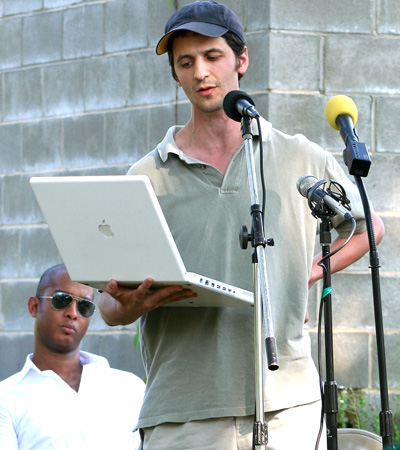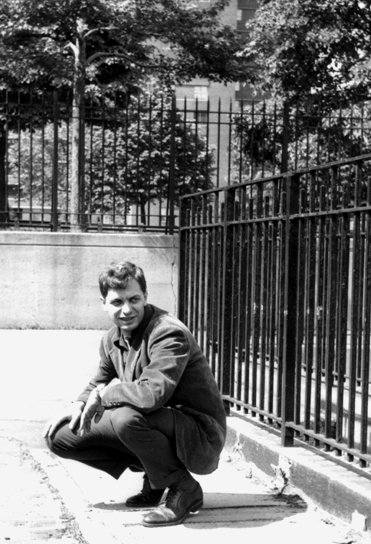Current

Ben Greenberg presents research in Longdale Community, Neshoba County, MS
I’m a writer, photographer and technologist with a professional background in communication strategy, human rights advocacy, blogging and journalism.
Currently I am investigating the murder of Clifton Walker---an African American man who was killed by whites outside of Woodville, Miss. on February 28, 1964—and a number of related stories about southwest Mississippi. My interest in the civil rights period was triggered in part by my research into the life of my own father, Paul A. Greenberg, who had been a special assistant to the Rev. Martin Luther King Jr. at the Southern Christian Leadership Conference in the early 1960s.
I am a founding member of the Civil Rights Cold Case Project---a collaborative project of the Center for Investigative Reporting and Paperny Films---bringing together the power of investigative reporting, narrative writing, documentary film making and interactive multimedia production to reveal the long-neglected truth behind unsolved civil rights murders, and to facilitate reconciliation and healing.
In 2006 I was guest co-editor for the March/April Dollars & Sense Magazine, a special issue devoted to the Gulf Coast region since Hurricane Katrina. I went on assignment for the magazine to Mississippi and Louisiana at the end of January, 2006.
I am employed by Management Sciences for Health (MSH), where I am Senior Manager of Online Communications. The views I express on hungryblues.net and other websites and networks linked here are my own and do not necessarily reflect those of MSH.
Some clips:
- USA Today, Decades after slaying, Mississippi family seeks justice
- Nieman Reports, "A Father’s Life Tugs His Son to Revisit Unsolved Crimes"
- Anniston Star, "Seeking 'peace on this earth': Detailing the need for Alabama to offer a formal apology"
- Colorlines, "Recy Taylor May Finally See Alabama Acknowledge Her 1944 Rape Case"
- Colorlines, "Investigations Force Feds to Revisit Murders of Civil Rights Era"
- Clarion-Ledger, with Jerry Mitchell, "Killen claims God is on his side" (PDF)
- Colorlines, "The Legacy of a Murder" (PDF)
- The American Prospect, "Belated Justice for Civil Rights Era Crimes"
- The Black Commentator, "Who Killed Jimmie Lee Jackson?"(feature; also archived here)
- Dollars & Sense, "Gone to Mississippi"
- Dollars & Sense, "Ground Zero of Someone Else's Future"(interview)
- Dollars & Sense, Excerpts from additional Gulf Coast interviews
- In These Times, "Voter Disenfranchisement By Attrition: With Friends Like FEMA Who Needs Jim Crow"
Some photos:
Some of my poems are in the Hungry Blues archive.
In the above photo, I am presenting research at the 43rd Annual Mississippi Civil Rights Martyrs Memorial Service and Conference on the Steele family land in the Longdale Community, Neshoba County, MS, June 23, 2007. The photo was taken by Susan Klopfer.
Basics
This blog began in March 2004 as a way to pursue research and writing about the life and times of my father, Paul Arthur Greenberg. Studying political history and getting to know some of my father's contemporaries in the Civil Rights Movement radicalized me politically, and the focus of this blog quickly expanded.
Starting this blog has led me to friendships and political activism with Movement veterans. It has taken me to Mississippi and Alabama. Hungry Blues has led to my current work as a journalist and in internet communications for a human rights organization.
Background
I was born in 1969 when my father was 41. From about age 18 to age 36 (1945-1963) he was directly involved in many of the political struggles that shaped the American left—labor, disarmament, civil rights.
From about age 14 to age 41 (1941-1969), my father had close friendships with some of the finest jazz musicians of the swing era—Pee Wee Russell, Max Kaminsky, Rex Stewart and, especially, Frankie Newton.
By the time I was born, many of the pursuits and relationships that had so defined my father were drifting into the past. Growing up, I heard bits and pieces of my father's experiences in politics and on the jazz scene, but he was not one for keeping track of details or keeping chronologies straight. My father's stories about these times were largely nostalgia pieces, not oral history.
I was born in New York City, but I mostly grew up in Delmar, NY, a suburb of Albany. My neighborhood was pleasant, somewhat conservative, predominantly white, middle-class: a typical bedroom community for people with jobs in state government and at the local universities and colleges. The public high school, which I attended, had only the smallest handful of African-American students or other students of color.
Back at our house, the Reverend Dr. Martin Luther King, Jr. was simply Martin, my dad's old boss. You could hear stories about New York jazz clubs like Minton's and the Cafe Society and talk about labor unions, nuclear disarmament, socialism. African American literature and music and civil rights activists were constant reference points. My father's good friend William Douthard, a Black youth leader in the civil rights struggles of Birmingham, AL and elsewhere in the state, lived with us in our house in the suburbs for some months, when he first moved to Albany in 1978.
When my father died in 1997, I had no command of this history. To commune with him, I started collecting the jazz recordings of Frankie Newton. Collecting recordings led to researching Frankie Newton, which led to learning more about my father's brief stint in the Communist Party and his introduction to the labor movement in the 1940s. Which led me to learn about Bayard Rustin, disarmament, Civil Rights Movement—and much more.
Everything followed from those Frankie Newton recordings.
Everything followed from a love of jazz and the act of writing.
Epigraph and recording
The name of this blog comes from the title of a song written by Langston Hughes and James P. Johnson for an almost lost jazz opera, called De Organizer. I fell in love with the work of James P. Johnson, one of the creators of jazz piano, through his brilliant collaborations with Frankie Newton on a handful of recordings from 1939.
1939 was also the year that James P. Johnson and His Orchestra made two commercial recordings of "Hungry Blues." The singer Anna Robinson performs a slightly different improvisation on the lyrics in each recording. The text of the epigraph and the audio are from the session on June 15 (the other was on March 9).
Here's the lineup:
- Henry “Red” Allen - trumpet
- J. C. Higginbotham - trombone
- Gene Sedric - tenor sax
- James P. Johnson - piano
- Eugene Fields - guitar
- Pops Foster - bass
- Sid Catlett - drums
- Anna Robinson - vocal

Paul Greenberg in New York City, 1961
Can anyone identify the location in the City?









Recent Comments